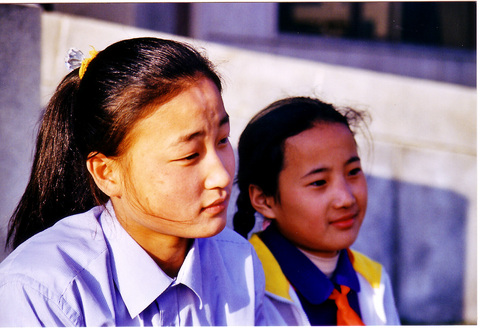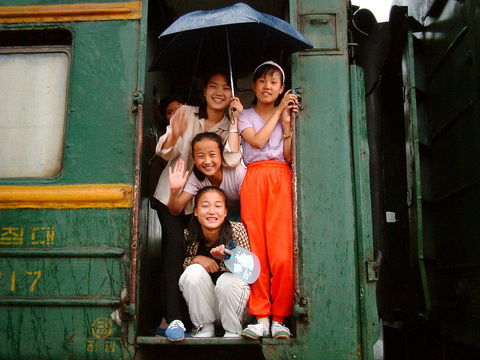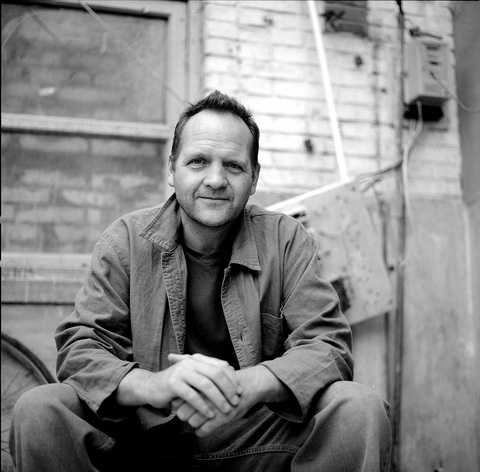The Democratic People's Republic of Korea, the world's last hard-line Communist sate, has been sealed from outside influences since the Korean War and branded a "rogue state" by the US. Its citizens are portrayed as robotic people cowering to the personality cult of "Dear Leader" Kim Jong-il.
Nicholas Bonner, a British specialist on North Korea who has run the travel agent Koryo Tours (www.koryogroup.com) in Beijing leading tours to the "Hermit Kingdom" for the past 15 years, has shone a light into the dark recesses of the secretive state through producing three acclaimed documentaries on the everyday lives of North Koreans.
"You can't leave the hotel without your guide [all foreign visitors in North Korea are accompanied by Korean minders] and there are lots of restrictions unthinkable to the outside world, but if you are willing to look beyond all these, you will find a human face of the country," said Bonner at the screenings of his first and second documentaries, titled The Game of Their Lives and A State of Mind, respectively, at the Urban Nomad Film Fest (城市游牧影展) last week in Taipei.

PHOTOS COURTESY OF NICHOLAS BONNER
Bonner's first experience of North Korea was in 1993 when the landscape architect left his lecturing post at Leeds Metropolitan University and moved to Beijing where he set up a jazz bar in the city. A trip to Pyongyang with his Chinese scholar friend Josh Green turned out to be the beginning of a pioneering tourism business.
"A few minutes after our arrival in the city, we thought 'hey, there is a great business opportunity here' since there were virtually no tourists in this extraordinary place. But we quickly found out why there wasn't anybody in the business; … not many people were interested in visiting North Korea," said Bonner, who puts the annual number of foreign tourists visiting the Hermit Kingdom at around 1,000.
Though his tourism operation seems to come nowhere close to a brisk trade, the plucky pioneer has taken up the role of cultural ambassador between North Korea and the rest of the world by organizing cultural projects, school exchanges and football friendship matches in addition to regular scheduled tours.

In 1997, British director Daniel Gordon contacted Bonner after the North Korean World Cup team of 1966 shocked the world by defeating one of the tournament favorites, Italy, and then vanishing from view after returning home.
With the help of his North Korean football mates, Bonner discovered the whereabouts of the surviving players and the film project The Game of Their Lives took shape.
To most observers, breaking through the political barriers erected by the authoritarian regime in North Korea where photography is restricted and most places are off-limits, would seem to be a mission impossible. But to Bonner, the real problems lay elsewhere.

"The problem was not with the North Koreans but with the funding. Nobody believed we could achieve the unachievable task … . The only film crew that had been granted official access to the country was a Polish team in 1980s," Bonner recalled.
In 2000, after soliciting private donations of US$7,000 from friends and relatives, Bonner and Gordon, along with two cinematographers and a sound man were given unprecedented official access to the players, members of the public and locations and told the incredible story of how the soccer team from the world's only hereditary Communist state arrived in England at the height of the Cold War, beat Italy 1-0 and entered the World Cup quarterfinals.
Accompanied by North Korean guides and interpreters throughout the shoot, the film crew quickly came to a mutual understanding with the authorities, which cooperated rather than interfered with the project. "First we thought the guides were there to tell us what we could and couldn't do, but they were, in fact, knowledgeable film people and we had this incredible female guide who always pushed things through on our side," Bonner said.
The apolitical documentary, which addresses the ability of sport to bridge cultural divides, has been well received around the world, especially in North and South Korea.
"It is more than apparent to anyone that it is an authoritarian regime where citizens subordinate their individual desires to the collective need," Bonner said. "There is enough tension around it and our goal is to let people speak for themselves and have their own voice in the films."
With such principles in mind, the crew set out to make their second documentary, A State of Mind, in 2003. The film follows two young gymnasts and their families for the nine months leading up to the Mass Games, the world's largest choreographed gymnastics display. The spectacular show is dedicated to "Dear Leader" Kim Jong-il.
Observing individuals' lives systematically coerced and socialized into the socialist system, the film gives an incredible insight into one of world's least known societies. The crew gradually gained the acceptance and trust of the families they were filming by spending hours interacting with them without the cameras around.
Personal stories aside, the film reveals the extent of North Koreans' devotion to Kim il-sung, their Eternal President who died in 1994 but who remains Head of State, and his son and successor, Kim Jong-il, and juche, the state philosophy that advocates self-reliance.
The harsh reality of life in North Korea is revealed through stories of the "arduous march," a term used to refer to devastating famines in the 1990s — put on public record for the first time in Bonner's film by a North Korean citizen — the common blackouts at night, constant food shortages and the anti-American sentiment taught in revolutionary history classes at school.
For Bonner, both films show the daily lives of ordinary people, but from different perspectives. "It's not possible to remain neutral or objective in a documentary, the best thing we can do is to keep it balanced," said the good-humored Brit, adding the film hasn't been shown in the North Korea.
With his first-hand experience of North Korea, Bonner continues to facilitate dialogue between the restrictive sate and the international community.
After taking his first tour group of US citizens to DPRK this month, where Cold War sentiment is still strong, Bonner said the interaction between locals and the US tourists was amazing. He pointed to a picture in which a group of smiling North Koreans surrounds an American lady in an amusement part where locals can throw paint balls at American figures painted on wooden boards as a form of recreation.
"It's just lovely to see how the former enemies, Chinese, Japanese, Koreans and Americans all chat happily together … . You can't rush things and each small step counts," said Bonner, who has more film projects in the pipeline.
His third documentary, Crossing the Line, is about four American defectors who crossed the Korean demilitarized zone in 1960s to live in North Korea.
A State of Mind will be screened next Sunday at NTUE Nanhai Gallery (南海藝廊), 3, Ln 19, Chungqing S Rd Sec 2, Taipei (台北市重慶南路二段19巷3號) and again at Hsinchu Municipal Image Museum, 65 Chungcheng Rd, Hsinchu City (新竹市中正路65號), on May 19 along with The Games of Their Lives. For more information on the two documentaries, visit www.thegameoftheirlives.com and www.astateofmind.co.uk/default.aspx.

May 18 to May 24 Pastor Yang Hsu’s (楊煦) congregation was shocked upon seeing the land he chose to build his orphanage. It was surrounded by mountains on three sides, and the only way to access it was to cross a river by foot. The soil was poor due to runoff, and large rocks strewn across the plot prevented much from growing. In addition, there was no running water or electricity. But it was all Yang could afford. He and his Indigenous Atayal wife Lin Feng-ying (林鳳英) had already been caring for 24 orphans in their home, and they were in

On May 2, Chinese Nationalist Party (KMT) Chairman Eric Chu (朱立倫), at a meeting in support of Taipei city councilors at party headquarters, compared President William Lai (賴清德) to Hitler. Chu claimed that unlike any other democracy worldwide in history, no other leader was rooting out opposing parties like Lai and the Democratic Progressive Party (DPP). That his statements are wildly inaccurate was not the point. It was a rallying cry, not a history lesson. This was intentional to provoke the international diplomatic community into a response, which was promptly provided. Both the German and Israeli offices issued statements on Facebook

Even by the standards of Ukraine’s International Legion, which comprises volunteers from over 55 countries, Han has an unusual backstory. Born in Taichung, he grew up in Costa Rica — then one of Taiwan’s diplomatic allies — where a relative worked for the embassy. After attending an American international high school in San Jose, Costa Rica’s capital, Han — who prefers to use only his given name for OPSEC (operations security) reasons — moved to the US in his teens. He attended Penn State University before returning to Taiwan to work in the semiconductor industry in Kaohsiung, where he

President William Lai (賴清德) yesterday delivered an address marking the first anniversary of his presidency. In the speech, Lai affirmed Taiwan’s global role in technology, trade and security. He announced economic and national security initiatives, and emphasized democratic values and cross-party cooperation. The following is the full text of his speech: Yesterday, outside of Beida Elementary School in New Taipei City’s Sanxia District (三峽), there was a major traffic accident that, sadly, claimed several lives and resulted in multiple injuries. The Executive Yuan immediately formed a task force, and last night I personally visited the victims in hospital. Central government agencies and the